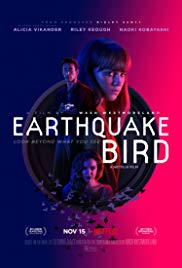
EARTHQUAKE BIRD
US, 2019, 107 minutes, Colour.
Alicia Vikander, Naoko Kobayashi, Riley Keough, Jack Huston.
Directed by Wash Westmoreland.
In more recent years, Wash Westmoreland has made a number of quite dramatic films, capitalising on the presence and dramatic impact and to schools of his leading ladies. Julianne Moore won an Oscar for her performance in Still Alice, a middle-aged academic with early Alzheimer’s. He also did the biography and study of the French author, Collette, a period piece with Keira Knightley in the central role. This time his film is a star vehicle for Alicia Vikander (who won an Oscar for her performance in The Danish Girl).
The setting is Tokyo, the central character is Lucy, a Swedish woman who acts as a translator.
When a young American woman is found murdered, there is suspicion on Lucy, the translator. She is interrogated by the police and this provides a framework for a series of flashbacks to her life in Tokyo.
Initially, there is a focus on her encounter with a photographer in the streets, who takes her picture without permission, she challenging him, but then their going to have a meal together – and a strong relationship ensuing. He is played by Naoko Kobayashi. The film traces the tensions between them, the falling in love, and the initial jealousy when a young American woman, Lily (Riley Keough) is helped by Lucy to find accommodation, a job as a waitress, and introduces her to the photographer.
It is best to wait until the very end to appreciate what is going on in Lucy’s mind. She fills in some background about her childhood, the death of one of her brothers in an accident that she caused, her parents’ reaction, her leaving home and settling in Japan. There is also an important sequence where she discusses her case with a friend, a woman magistrate, who enables her to see how she should apportion blame or not and appreciate feelings of guilt and responsibility.
There is also a strong psychological twist in the narrative – with the audience possibly thinking at the end that they should have picked this up earlier.
Because the film focuses on some mental deterioration in the character of Lucy, there is less of an invitation by the film to empathise with her, making it a somewhat cold experience.
1. A Japanese story? Westerners in Japan?
2. The Japanese settings, Tokyo, apartments, restaurants, diners, offices, police precincts? The visit to the countryside? The beauty? The ancient sites? The musical score?
3. The experiences of earthquakes? The meaning of the title?
4. The ultimate revealing of background stories, the effect of the past on the characters, the drama, the melodrama, the twist in the ending?
5. A drama of mental states, mental deterioration, isolation, blame from the past, love and passion, jealousy, willingness for harm or murder, the revelation of sexual insanity?
6. Lucy’s story, from Sweden, her age, her brothers, the later revelation of the accident, the brother’s death, her feeling insensitive, parents’ blame, feeling guilt, leaving home, learning Japanese, going to work as a translator in Tokyo? Her reserved personality? At work? The encounter in the streets, the photographs, the attraction to Teiji, eating with him, telling the truth (and ultimately, his not telling the full truth)? The continued photos, the effect on Lucy, the sexual attraction, taking off her top but his resisting? The outings, the company? The change in her? The gossip with her friends at work? The discussions with the local magistrate, her friend?
7. The initial indication of Lily Bridges, missing, theories about her death, accusations against Lucy, the interrogations by the Detective, her understanding the language, harsh attitudes, sympathetic attitudes? The flashbacks within this framework? Her finally confessing to the murder? The suspected body of Lily not that of Lily? The reaction of the detectives because of her confession?
8. Lily’s story, America, coming to Japan, ingenuous American, Lucy teaching her language, taking her out, finding accommodation? Introducing her to Teiji? The photos together?
9. Lucy, Teiji affecting her, yet some of his moods, her going to his apartment, unlocking the file, the photos of the other woman, his explanations?
10. The outing, the three together, Lucy and her increasing jealousy, feeling ill, sleeping, missing the note, finding the two together? Seeing Teiji photographing Lily?
11. Lucy and the increasing jealousy, her dreams and imagination, Lily staying with her, the dream threesome? Increasing Lucy’s motivation? Lily and her apologies to Lucy? Coming in the rain, Lucy not allowing her in?
12. Lucy’s visit to Teiji, the photos of herself, with Lily, the photograph of the dead Lily? Audience understanding what had happened? Teiji and his sexual propensities, murder?
13. Lucy and her talking with the magistrate, getting reassurance? The episode with the old lady slipping on the polished floor and dying? The magistrate explaining her responsibility for polishing, the death, but not blaming herself fully? Circumstances? And the same for Lucy and her background with her brothers?
14. The experience – and liberation for Lucy for her ongoing life?